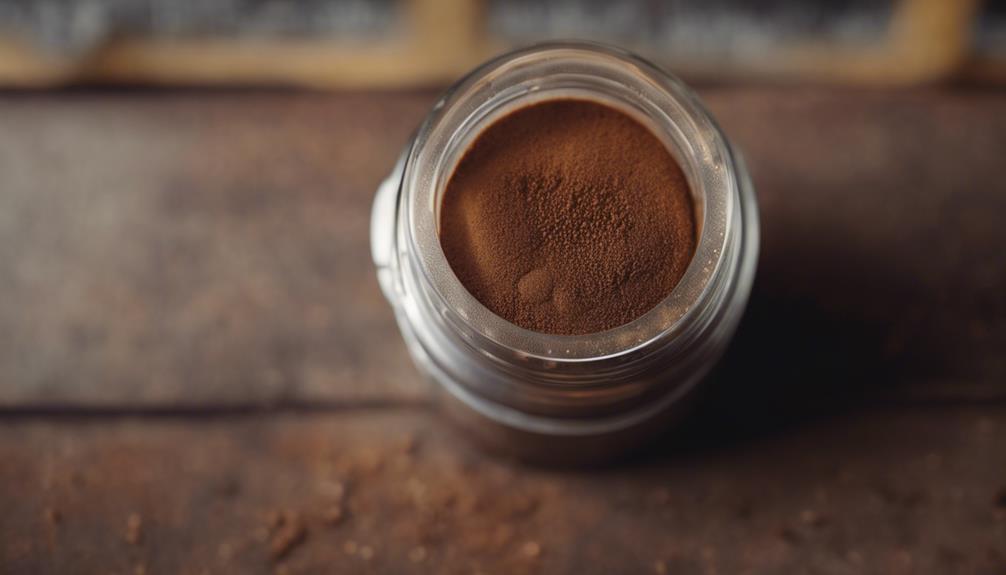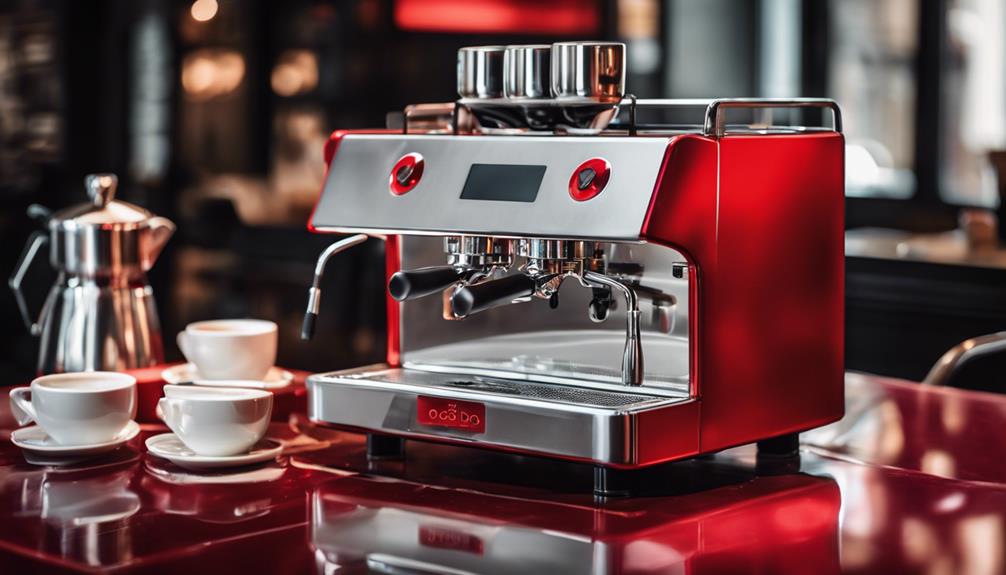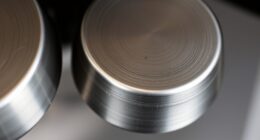Espresso powder can expire, influenced by how it is stored and by environmental factors. To ensure it remains fresh for longer, store it in an airtight container in a cool, dark place. Expiration is hastened by exposure to air, light, and moisture. Keep an eye out for changes in color, clumping, or a different taste as signs of spoilage. The shelf life can range from 6 months to 2 years, depending on how it is stored. Using expired powder can result in a weaker flavor and brewing difficulties. By employing proper storage techniques, you can maintain the taste and quality of your espresso powder. Delve further into the lifespan and culinary uses of espresso powder for more insights.
Key Takeaways
- Proper storage impacts expiration, lasting 6 months to 2 years.
- Signs of expiration include color changes and clumping.
- Using expired powder affects taste, aroma, and brewing quality.
- Airtight container in cool, dark place extends shelf life.
- Consider repurposing expired powder for baking or cooking.
Understanding Espresso Powder
If you've ever wondered about the essence of espresso powder, here's a quick breakdown for you. Espresso powder is created from darkly roasted coffee beans, finely ground to achieve a distinctive texture.
It's available in two main types: Pure Espresso Powder for cooking and baking, and Instant Espresso Powder for beverages and culinary applications.
While espresso powder doesn't have a strict expiration date, its flavor can diminish over time, affecting its potency. However, it remains safe for consumption even after this decline in flavor.
To guarantee the longevity of your espresso powder, it's essential to store it properly. Keep it in an airtight container in a cool, dry place, away from sunlight. Proper storage helps maintain the flavor and quality of the espresso powder, allowing you to enjoy its potent flavor profile for a longer period.
This unique ingredient differs from regular coffee powders, offering versatility in various culinary creations.
Shelf Life Factors
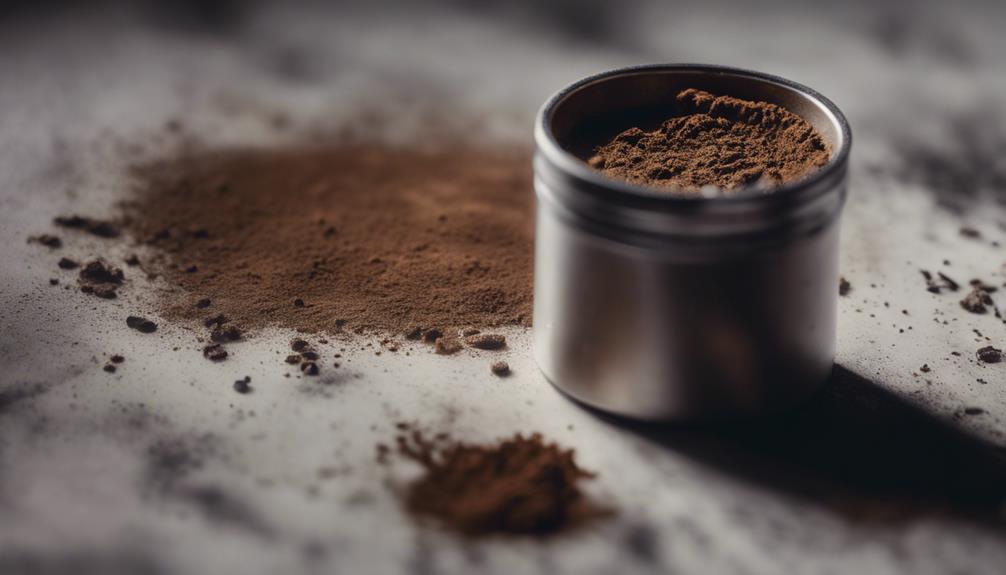
Espresso powder's shelf life hinges on storage conditions and the expiration date indicated on the packaging.
Properly storing the powder in an airtight container, shielded from heat, light, and moisture, can prolong its usability.
Factors like exposure to air, light, and moisture can hasten espresso powder's expiration and diminish its flavor and potency.
Storage Conditions Impact
Proper storage conditions greatly impact the shelf life factors of espresso powder. Storing espresso powder in a cool, dark place away from heat sources can help extend its lifespan. It's essential to keep the powder sealed in an airtight container to prevent exposure to air, which could lead to faster expiration.
Additionally, avoiding proximity to strong-smelling items is vital as espresso powder can absorb odors affecting its quality. Refrigeration is a useful method to maintain freshness and prolong the shelf life of espresso powder. For even longer preservation, freezing espresso powder is an effective option to prevent early expiration.
Expiration Date Significance
Storage conditions greatly influence the shelf life of espresso powder, but understanding the significance of the expiration date is also essential. The expiration date on espresso powder packaging serves as a guide to its shelf life, taking into account storage conditions and quality maintenance.
By storing espresso powder away from heat, moisture, and light, you can prolong its shelf life even beyond the expiration date indicated. Factors like air, light, and moisture exposure can hasten the expiration process. Keep an eye out for changes in color, aroma, taste, and texture as these are telltale signs that the espresso powder may have expired.
Regularly checking for signs of spoilage and monitoring the quality of the espresso powder can help you determine if it's still suitable for use. Remember, respecting the expiration date and proper storage practices are key to enjoying fresh and flavorful espresso.
Storage Recommendations
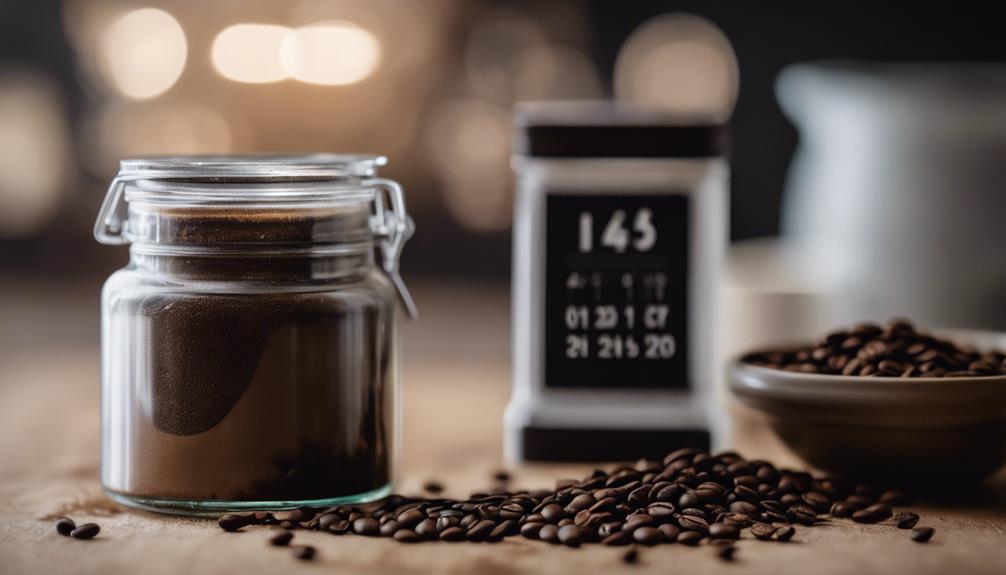
To maintain the freshness of your espresso powder, store it in an airtight container in a cool, dark place away from heat sources. Avoid exposure to air, light, and moisture to prevent the powder from expiring faster.
Keeping it away from strong-smelling items can also help maintain its flavor.
Proper Storage Conditions
Keep espresso powder in a cool, dark place away from heat sources to preserve its flavor and aroma. Storing the powder in an airtight container helps prevent exposure to air and moisture, which can impact its quality and shelf life. Avoid placing espresso powder near strong-smelling items to prevent absorption of unwanted odors. Refrigeration can extend freshness, while freezing can further prolong usability. Here's a practical table summarizing proper storage conditions for espresso powder:
| Storage Tip | Description |
|---|---|
| Keep in Cool, Dark Place | Preserves flavor and aroma by protecting from heat sources. |
| Seal in Airtight Container | Prevents exposure to air and moisture, extending shelf life. |
| Avoid Strong Odors | Protects against absorbing unwanted smells, maintaining quality. |
| Refrigerate for Freshness | Extends shelf life by preserving freshness. |
| Freeze for Prolonged Use | Further prolongs usability and prevents premature expiration. |
Shelf Life Expectations
To guarantee the best freshness, make sure you store your espresso powder in an airtight container in a cool, dark place. Espresso powder typically has a shelf life ranging from 6 months to 2 years, depending on how it's stored.
Exposure to air, light, and moisture can speed up the expiration process, reducing the quality of your espresso powder. When stored properly, in a cool and dark environment, espresso powder can maintain its flavor and potency for a longer period.
It's important to be mindful of any changes in color, aroma, taste, or texture, as these can be signs that your espresso powder has expired. Using expired coffee, whether in the form of beans or ground espresso powder, can result in a less flavorful and enjoyable coffee experience.
To make sure you get the best out of your espresso powder, make sure to check for signs of expiration and replace it when needed.
Signs of Degradation
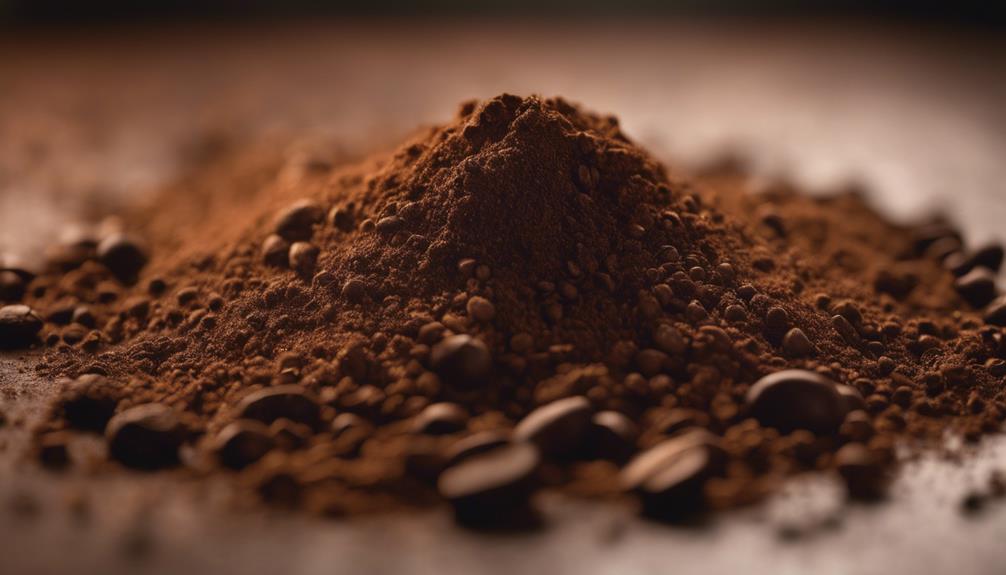
Watch out for any changes in color, texture, or clumping of your espresso powder as these are clear signs of degradation. If your espresso powder has expired, you might notice a stale taste or a loss of its rich coffee flavor.
Keep an eye (and nose) out for any unwanted odors emanating from the powder, as this can indicate spoilage. Additionally, if the espresso powder lacks its usual intensity or starts tasting more bitter than usual, it may be a sign that it's no longer fresh.
Remember that mold growth or any unusual odors are definitive indicators that your espresso powder has degraded and shouldn't be consumed. Always check the expiration date on the packaging to determine if the espresso powder is past its prime.
These signs of degradation are essential to pay attention to, as they can greatly impact the quality and safety of your espresso beverages.
Lifespan Estimates
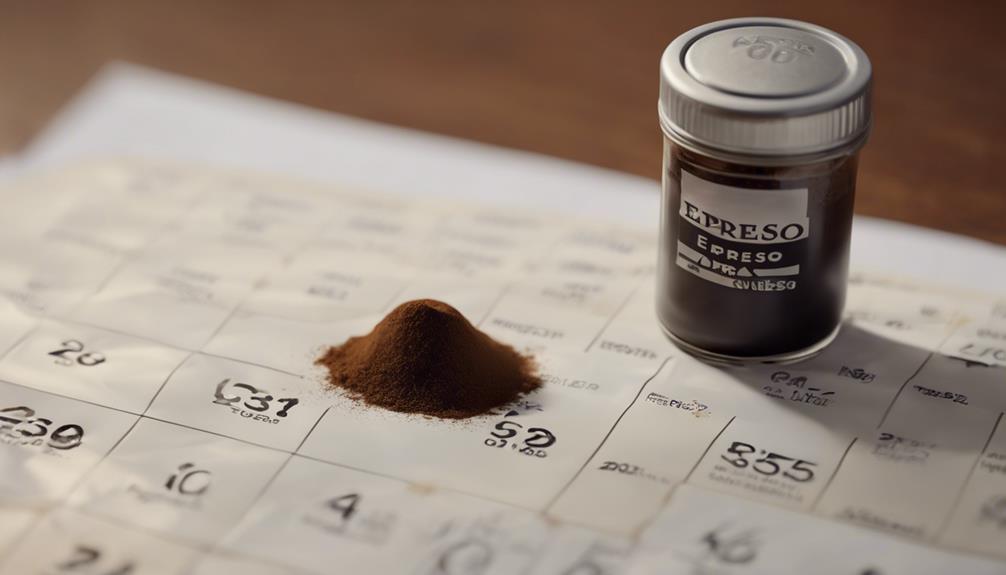
Curious about how long espresso powder typically lasts before it expires? Espresso coffee can generally maintain its quality for anywhere between 6 months to 2 years, depending on how it's stored.
To prolong its shelf life, it's important to keep the espresso powder in an airtight container. Exposure to air, light, or moisture can speed up the expiration process.
If you notice any changes in color, aroma, or taste, it may be a sign that the espresso powder has expired. Using expired espresso powder can result in a loss of potency and flavor, ultimately impacting the quality of your brewed beverages.
Hence, it's crucial to be mindful of the storage conditions and duration for which you've had the espresso powder to ensure you enjoy the best possible cup of espresso.
Culinary Applications
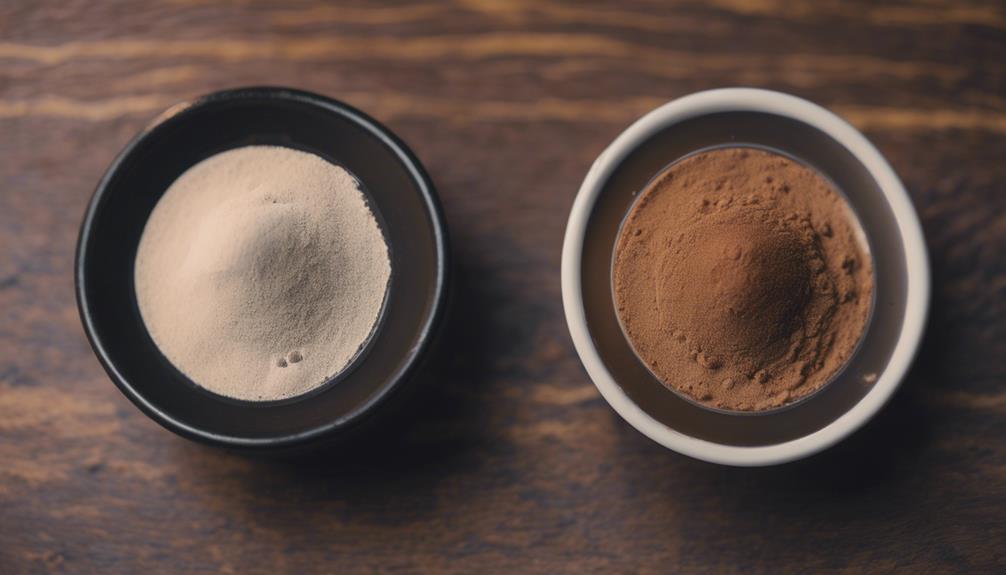
When incorporating espresso powder into your culinary creations, you can expect a boost in flavor and depth, particularly in dishes like meat marinades and baked goods.
Espresso powder is a versatile ingredient that enhances the taste of various recipes without overpowering them with a strong coffee flavor. In baking, it enriches the chocolatey goodness while balancing the sweetness, resulting in a rich and decadent treat.
This culinary gem also adds a delightful twist to chocolate, whipped cream, bread, and dairy dishes, elevating their overall taste profile.
Available in two main types—Pure Espresso Powder for cooking and baking, and Instant Espresso Powder for beverages and culinary use—this ingredient is derived from darkly roasted coffee beans, finely ground to provide a potent flavor that sets it apart from regular coffee powders.
Its ability to intensify the flavors of different dishes makes espresso powder a valuable addition to your pantry for enhancing the quality of your culinary creations.
Impact on Brewing Process
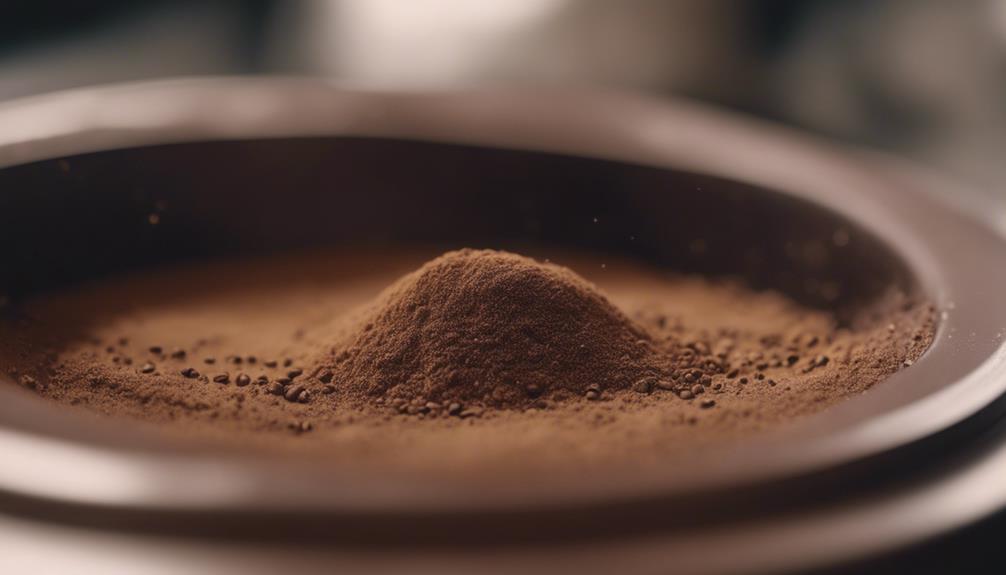
Using expired espresso powder during the brewing process can greatly affect the taste and quality of your espresso. When you use expired espresso powder, you might notice that your espresso is less flavorful and may have an altered aroma.
The brewing methods can be compromised as expired powder may not dissolve well, impacting the texture of your espresso. This can result in a weaker coffee flavor and a less satisfying coffee experience overall.
Additionally, consuming expired espresso powder can lead to stomach discomfort, affecting your enjoyment of the brew. It's important to verify the freshness of your espresso powder before using it to brew your coffee.
Pay attention to the expiration date and consider the impact that expired espresso powder can have on the coffee roasting process, as it plays a significant role in the quality and taste of your espresso.
Storage Solutions
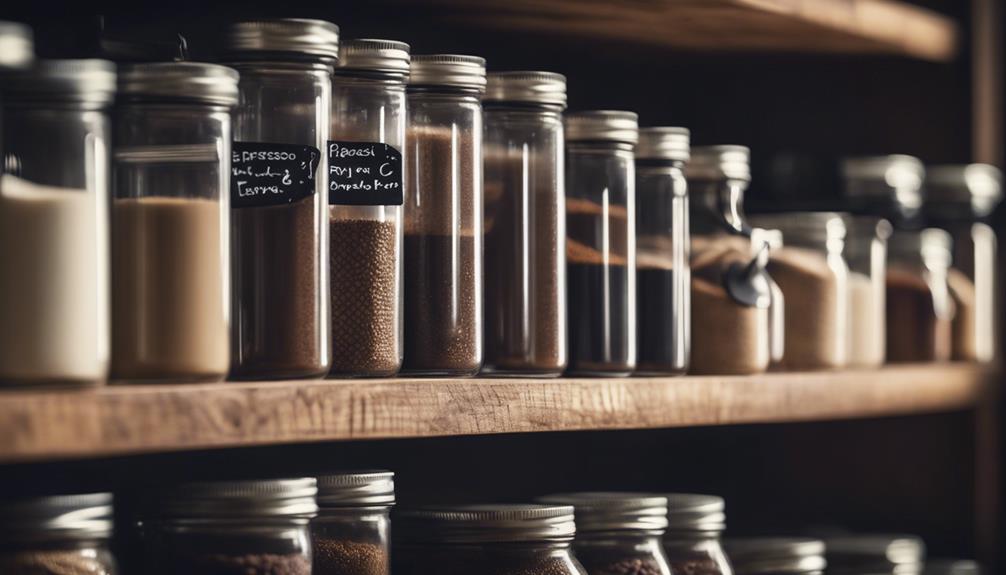
Properly storing espresso powder in an airtight container can significantly extend its shelf life. To guarantee your espresso powder stays fresh for longer, follow these storage solutions:
- Choose the Right Container: Opt for an airtight container to prevent air from seeping in and affecting the quality of the espresso powder.
- Keep It Cool and Dark: Store the container in a cool, dark place away from heat sources to maintain the flavor and aroma of the espresso powder.
- Avoid Exposure: Shield the espresso powder from air, light, and moisture to prevent it from expiring prematurely.
- Consider Refrigeration or Freezing: For even longer shelf life, you can refrigerate or freeze the espresso powder. Refrigeration can help preserve it, while freezing can effectively extend its usability.
Frequently Asked Questions
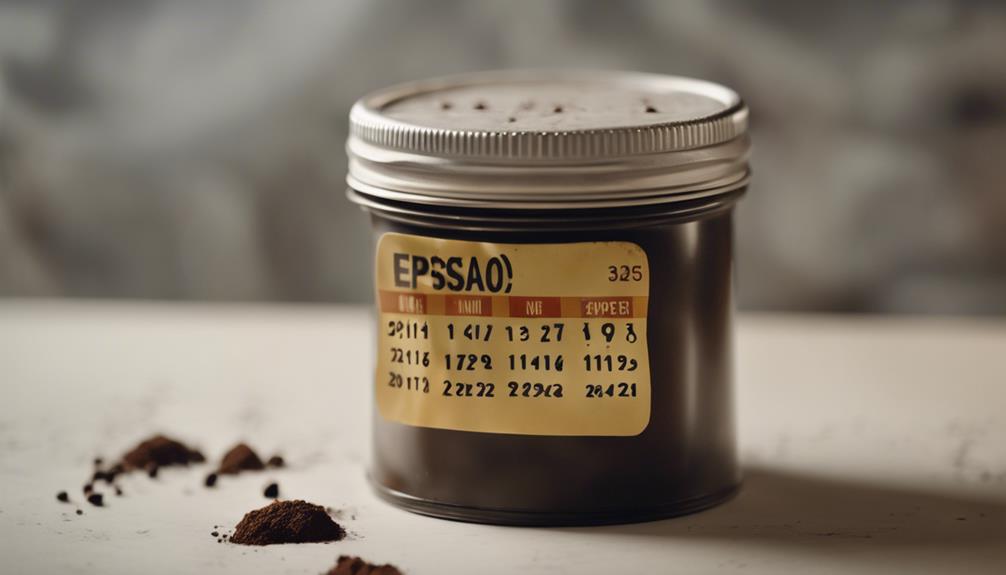
For those curious about espresso powder longevity and usage, let's address some common questions in this domain.
When does espresso powder expire? Espresso powder typically lasts 6 months to 2 years, but signs of expiration include color changes, clumping, mold growth, and off-putting odors.
What happens if you use expired espresso powder? Using expired espresso powder may lead to a weaker coffee flavor, altered taste, texture issues, and potential stomach discomfort.
How should espresso powder be stored? Proper storage involves keeping it in an airtight container in a cool, dark place away from heat sources and strong odors.
Can expired espresso powder be repurposed? To reduce waste, consider using expired espresso powder for baking or cooking, sharing excess with others, or exploring sustainable packaging options.
Frequently Asked Questions
What Is the Shelf Life of Espresso Powder?
Espresso powder typically has a shelf life ranging from 6 months to 2 years, depending on storage conditions. Properly stored in an airtight container in a cool, dark place can extend its freshness.
Exposure to air, light, or moisture can expedite expiration and diminish potency. Changes in color, aroma, or taste signal expired powder. This can lead to a weaker coffee flavor and compromise the quality of your espresso beverage.
Can You Use Expired Espresso?
If you find yourself with expired espresso powder, it's best to discard it. Using expired espresso might lead to a weaker flavor, texture issues, and even digestive discomfort.
To guarantee a quality espresso experience, always check for signs of expiration like changes in color, aroma, or taste. It's better to be safe and enjoy a fresh cup of espresso instead of risking the quality of your drink with expired powder.
Can We Use Expired Coffee Powder?
You can use expired coffee powder for various purposes around your home. Whether it's enhancing baked goods, adding flavor to savory dishes, or absorbing odors in your kitchen, expired coffee powder can be quite handy.
It's also effective as a natural cleaning agent for scrubbing surfaces or removing grease. While it mightn't be the best choice for drinking, expired coffee powder can still be practical in different ways.
Is Espresso Powder the Same as Espresso Instant Coffee?
Espresso powder differs from instant espresso coffee in texture, composition, and usage. Espresso powder is crafted from brewed and dried coffee, offering a concentrated flavor ideal for baking.
On the other hand, instant espresso coffee is freeze-dried or spray-dried, dissolving quickly in water for immediate beverages.
While espresso powder enhances chocolate flavors without a pronounced coffee taste, instant espresso coffee serves as a convenient option for quick coffee preparations.
What is the Shelf Life of Espresso Powder?
The espresso powder shelf life expiration can vary depending on how it’s stored. When kept in an airtight container in a cool, dark place, espresso powder can last up to 2 years. However, if exposed to air, light, or moisture, it may start to lose its flavor and potency before that time.
Is Expired Espresso Powder the Same as Expired Espresso Shots?
When it comes to espresso, the expiration date is crucial. Expired espresso shots can lose their flavor and potency, making them less enjoyable to drink. However, expired espresso powder is different. While it may not taste as good as fresh powder, it won’t have the same adverse effects as expired espresso shots. Espresso shots expiration date explained.
Conclusion
To sum up, just like a fine wine, espresso powder may lose its flavor over time. However, with proper storage and use within a reasonable timeframe, you can keep enjoying its rich and bold taste in your favorite recipes.
So, remember to check for any signs of degradation, keep it sealed tight, and make the most of every sprinkle of this caffeinated magic in your culinary creations.
Stay fresh, stay flavorful!
